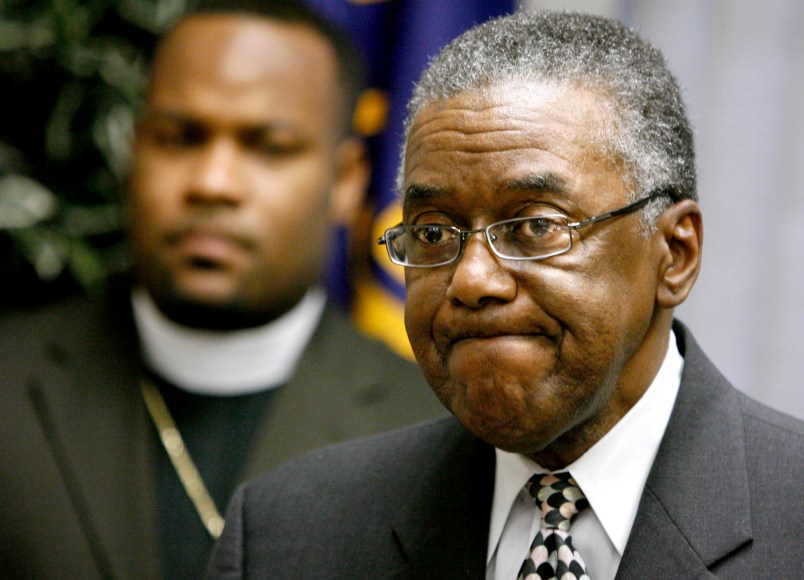COLUMBUS, Ohio (AP) — Judges who perform marriages in Ohio can’t refuse to marry same-sex couples on personal or moral grounds or because of religious beliefs, according to a state judicial conduct board.
In addition, judges who stop performing all marriages to avoid marrying same-sex couples may be interpreted as biased and could be disqualified from any case where sexual orientation is an issue, according to an opinion by the Ohio Supreme Court’s Board of Professional Conduct issued Friday and made public Monday.
The ruling followed a request for guidance from a Toledo judge who refused to perform a same-sex wedding last month.
Municipal Judge C. Allen McConnell said he didn’t marry a same-sex couple because of his religious beliefs after the U.S. Supreme Court made gay marriage legal in all 50 states in June.
McConnell said Monday he would abide by the board’s opinion and would marry a same-sex couple if requested.
Judges’ oaths to support the state and U.S. constitutions also require them to honor court interpretations of constitutional matters, the judicial board said in its opinion.
“Public confidence in the independence of the judiciary is undermined when a judge allows his or her beliefs concerning the societal or religious acceptance or validity of same-sex marriage to affect the performance of a judicial function or duty,” the board said.
The lead plaintiff in the case that led to the U.S. Supreme Court’s landmark ruling was Jim Obergefell of Cincinnati. He sued Ohio’s health director for refusing to list him as the surviving spouse on his husband’s death certificate. Ohio voters banned gay marriage in 2004.
The judicial board’s ruling is nonbinding but could be used by the Ohio Supreme Court for guidance.
The decision didn’t spell out specific punishment a judge could face for refusing to marry a same-sex couple.
Ohio judges who violate judicial codes of conduct face punishments ranging from reprimands to disbarment.
The board emphasized that refusing to perform all marriages creates its own set of problems, including perceptions about a judge’s performance of other duties.
“For example, if a judge who has declined to perform same-sex marriages is later assigned to hear a misdemeanor domestic violence charge involving a same-sex couple, the judge’s ability to follow the law and impartially apply the domestic violence laws could reasonably be questioned,” the board said.
The Association of Municipal and County Judges of Ohio also asked the board for clarification on the issue.
___
Andrew Welsh-Huggins can be reached on Twitter at https://twitter.com/awhcolumbus.
___
This story has been corrected to show that the U.S. Supreme Court ruling that legalized gay marriage was in June, not July, and that the judicial board’s ruling was issued Friday, instead of Monday.
Copyright 2015 The Associated Press. All rights reserved. This material may not be published, broadcast, rewritten or redistributed.







McConnell said Monday he would abide by the board’s opinion and would marry a same-sex couple if requested.
Gee, that’s very big of you, Judge. Thanks a lot.
Bigot.
Seems this judge is already on record as biased against same-sex couples.
Will he be disqualified from such cases as mentioned?
If the judge is biased against same-sex couples based on religious grounds, what other biases does he bring to the bench based on his sincere beliefs in fairy tales?
Such judges should simply be removed.
“OK, so I guess I will grudgingly perform same-sex marriages when absolutely forced to” does not sound like someone who is unbiased enough to be a judge on any case.
Damn Straight!
If you cannot “DO YOUR JOB” because of your religious views, GET ANOTHER JOB!
I am sick and tired of bending over backwards for those whose “personal religious beliefs” are antediluvian.
If your adherence to bronze-age-fairy-tales is SO STRONG you cannot function in a modern society, then GET THE HELL OUT!
I hear its nice in Somalia this time of year…